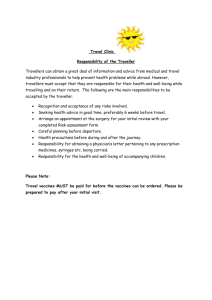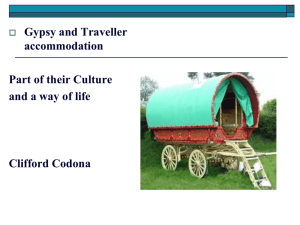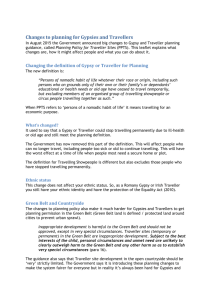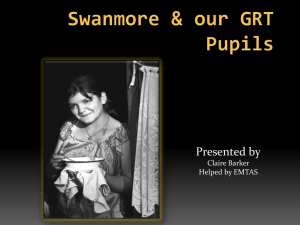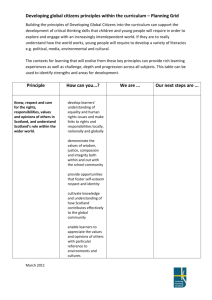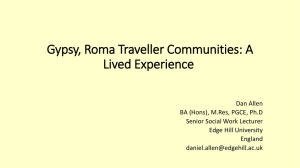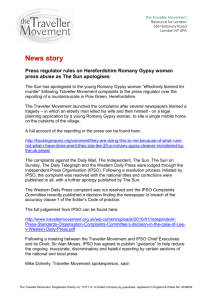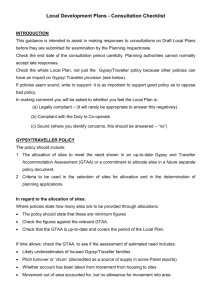Learning journey: A Celebration of Gypsy/Traveller Communities in Scotland Introduction:
advertisement
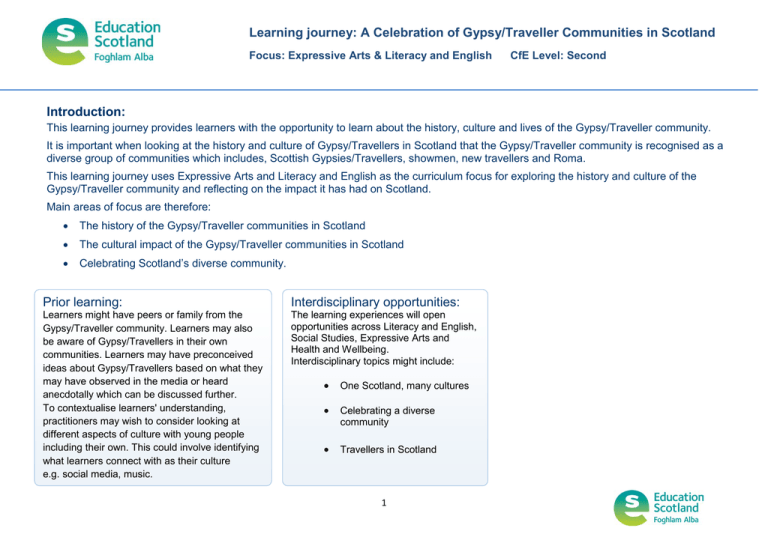
Learning journey: A Celebration of Gypsy/Traveller Communities in Scotland Focus: Expressive Arts & Literacy and English CfE Level: Second Introduction: This learning journey provides learners with the opportunity to learn about the history, culture and lives of the Gypsy/Traveller community. It is important when looking at the history and culture of Gypsy/Travellers in Scotland that the Gypsy/Traveller community is recognised as a diverse group of communities which includes, Scottish Gypsies/Travellers, showmen, new travellers and Roma. This learning journey uses Expressive Arts and Literacy and English as the curriculum focus for exploring the history and culture of the Gypsy/Traveller community and reflecting on the impact it has had on Scotland. Main areas of focus are therefore: • The history of the Gypsy/Traveller communities in Scotland • The cultural impact of the Gypsy/Traveller communities in Scotland • Celebrating Scotland’s diverse community. Prior learning: Interdisciplinary opportunities: Learners might have peers or family from the Gypsy/Traveller community. Learners may also be aware of Gypsy/Travellers in their own communities. Learners may have preconceived ideas about Gypsy/Travellers based on what they may have observed in the media or heard anecdotally which can be discussed further. To contextualise learners' understanding, practitioners may wish to consider looking at different aspects of culture with young people including their own. This could involve identifying what learners connect with as their culture e.g. social media, music. The learning experiences will open opportunities across Literacy and English, Social Studies, Expressive Arts and Health and Wellbeing. Interdisciplinary topics might include: • One Scotland, many cultures • Celebrating a diverse community • Travellers in Scotland 1 Learning journey: A Celebration of Gypsy/Traveller Communities in Scotland Focus: Expressive Arts & Literacy and English CfE Level: Second Relevant Experiences and Outcomes: Expressive Arts: • • • • I have experienced the energy and excitement of presenting/performing for audiences and being part of an audience for other people’s presentations/ performances. EXA 2-01a Inspired by a range of stimuli, I can express and communicate my ideas, thoughts and feelings through activities within art and design. EXA 2-05a Inspired by a range of stimuli, I can express and communicate my ideas, thoughts and feelings through drama. EXA 2-13a Inspired by a range of stimuli, and working on my own and/or with others, I can express and communicate my ideas, thoughts and feelings through musical activities. EXA 2-18a Literacy and English: • • • • • When listening and talking with others for different purposes, I can: o share information, experiences and opinions o explain processes and ideas o identify issues raised and summarise main points or findings o clarify points by asking questions or by asking others to say more LIT 2-09a Using what I know about the features of different types of texts, I can find, select and sort information from a variety of sources and use this for different purposes. LIT 2-14a I enjoy creating texts of my choice and I regularly select subject, purpose, format and resources to suit the needs of my audience LIT 2-20a I am learning to use language and style in a way which engages and / or influences my reader ENG 2-27a Having explored the elements which writers use in different genres, I can use what I learn to create stories, poems and plays with an interesting and appropriate structure, interesting characters and / or settings which come to life ENG 2-31a Social Studies: • • I can explain how the needs of a group in my local community are supported. SOC 2-16a I can discuss issues of the diversity of cultures, values and customs in our society. SOC 2-16c 2 Learning journey: A Celebration of Gypsy/Traveller Communities in Scotland C Focus: Expressive Arts & Literacy and English CfE Level: Second Learning Experience A: The history of the Gypsy/Traveller community in Scotland Introduction Possible learning opportunities / tasks Possible evidence Historical records of Gypsies/ Travellers in Scotland dates back to the 15th century. Historical records show that the Romani people arrived in Scotland in the 15th century and from there mixed with indigenous groups in Scotland, some of whom may also have had nomadic traditions. This mixing of culture and tradition is reflected in the Gypsy/Traveller language of “cant” which takes language from Scots, Gaelic and Romani. Learners could: • Work co-operatively to research the main Gypsy /Traveller communities in Scotland, and compare the differences and similarities of these groups throughout history. This could include looking at language, culture and beliefs from each group but also the language used to describe these groups by others. Learners can: Write Produce materials in the form of short stories, poems and folk songs Make Create pieces of artwork to reflect their learning of Scottish Gypsy/Travellers and their culture. Say Discuss the cultural impact the Gypsy/Traveller community has had on Scotland. • Stimulus: Learners could be asked what they know about : • Different Gypsy/Traveller communities • History of the Gypsy/Traveller community in Scotland. • Folk songs Key learning At the end of this learning experience learners will: • Understand the diverse groups of Gypsies/Travellers in Scotland. • Understand the cultural impact the Gypsy/Traveller community has had on Scotland. • Creatively share Gypsy/Traveller history through music and poetry. • Successfully identify Gypsy/Traveller figures throughout history who have had an impact on cultural aspects of Scotland. • Can reflect on the positive changes migration has had on Scotland • Can share the benefits of a diverse culture in their own community. • Share folk lore and songs from these travelling communities and research the history of this to gain a more in depth knowledge of these stories Research famous Gypsies/Travellers throughout history. Track their life stories looking at family, housing, employment, possible hardship. e.g. Belle Stewart, Sheila Stewart and Duncan Williamson. Learners can also: Develop storytelling techniques through creating their own folk lore or traveller songs. Useful resources Reflecting on learning: Questions for learners: • What have you learned about the history of the Gypsy/Traveller communities in Scotland? • What do you think is the biggest contribution Gypsies/Travellers have made to Scotland? • What aspects of the Gypsy/Traveller culture can you recognise in your own community? Taking it further • http://www.step.education.ed.ac.uk/ http://www.article12.org/resources/ https://en.wikipedia.org/wiki/Belle_Stewart https://en.wikipedia.org/wiki/Sheila_Stewart http://www.theguardian.com/news/2007/nov/22/guardianobitu aries.obituaries1 http://www.srtrc.org/resources/publications?publication=478 3 • Learners could develop the stories, songs or poems they have produced into a play to be performed for the wider school community. Learners could identify Gypsies/Travellers in their local community and invite speakers to the class. Learners would have the opportunity to interview Gypsies/Travellers based on the information they have gathered so far. Learning journey: A Celebration of Gypsy/Traveller Communities in Scotland Focus: Expressive Arts & Literacy and English CfE Level: Second Learning Experience B: Tackling prejudice through learning Introduction Possible learning opportunities / tasks Possible evidence The 2011 census highlights that Scotland is more multi-cultural than ever before, and our communities more ethnically and religiously diverse. However, the Scottish Attitude Survey 2010 also highlights that 28% of people still think it is acceptable to hold a prejudice towards people. The Gypsy/Traveller community face prejudice in areas such as employment, housing and the use of negative language. Learners could: • Research the day to day lives of the Gypsy/Traveller community. This could include exploring the various housing options and the range of employment often carried out by people in the Gypsy/Traveller community. Learners can: Write Personal profiles of those in the Gypsy/Traveller community. Make Artwork which reflects day to day life of Gypsies /Travellers. Say Participate actively in a discussion regarding the portrayal of Gypsy/Travellers in the media. Stimulus Ask: • Does anyone know words/phrases that they can relate to the Gypsy/Traveller community? • Has anyone seen any programmes with Gypsy/Travellers on the television? • What do they think about the shows and how the people are portrayed? • Do they think this is accurate? Key learning Learners can: • Identify negative and inappropriate language and the effects using this language can have. • Identify commonalities and differences in the travelling and settled community. • Identify accuracies and exaggerations in the media. • Recognise discrimination and be confident in how they might respond. • Produce a personal profile for a Gypsy/Traveller, looking at their life history, work, family and any discrimination they may face. • Reflect on the commonalties and differences between their lives and those of Gypsies/Travellers. If there are Gypsies/Travellers learners in the class this is an opportunity to look at a comparison between both communities. • Watch clips from recent television shows regarding Gypsy/Traveller lifestyles and have a discussion that explores the reality of these shows in relation to their learning. Discussions could include: o The accuracy of the media reporting and portrayal o The impact of the media on the Gypsy / Traveller o community o The impact and power of the media on all minority groups Useful resources http://www.step.education.ed.ac.uk/ http://www.gypsy-traveller.org/your-rights-2/ http://www.eis.org.uk/public.asp?id=923&parentid=0&dbase=2 http://www.bbc.co.uk/news/uk-scotland-19691232 4 Reflecting on learning Questions for learners: • What are the commonalities and differences between the settled and travelling community? • What forms of discrimination do Gypsies/Travellers face? • What impact does the media have on how the public portrays minority groups? Taking it further • • • Learners could: Make links with a Gypsy/Traveller organisation to discuss their findings regarding discrimination. Using the organisation link they could find out if, or how discrimination is being tackled in their own community. Hold peer learning events to share their learning. Develop an equalities group in school to look at all forms of discrimination and their role in tackling it. Learning journey: A Celebration of Gypsy/Traveller Communities in Scotland Focus: Expressive Arts & Literacy and English CfE Level: Second Learning experience C: Celebrating together Introduction Possible learning opportunities / tasks The first two learning experiences focus exclusively on the Gypsy/Traveller culture. The final experience gives learners the opportunity to learn about several different cultures that are actively involved in creating a diverse Scotland. Learners will have the opportunity to look at how we can celebrate a range of cultures in our multicultural society. Learners could: • Work collaboratively to explore the different cultures that contribute to Scotland’s diverse and multi-cultural society and develop pieces of artwork that reflect the culture they have researched ( this could include national dress, food, music, dance, religion) • Use their artwork and research to develop guidebooks highlighting some of the cultural groups in their community , creating a calendar as part of this to highlight interesting traditions and practices within the cultural groups in their local area • Prepare presentations that can be shared with the rest of the class or wider school community through assembly. These presentations could include examples of dance, music and artwork they have developed . Stimulus Ask: • Are you aware of the different cultural influences in our society? • Are there different cultures/ groups in our community that we are aware of but would like to learn more about? Key learning Learners can: • Identify various groups that add to a diverse culture in Scotland. • Understand the benefits of a diverse culture. • Share the information they have gathered on various cultures in a format that others can learn from. • Confidently share their findings on various cultures within the class and wider school community. Useful resources http://www.scotland.org/about-scotland/scottish-cultureand-traditions http://wiki.cultured.com/cultures/ http://www.buzzle.com/articles/world-cultures-heritage/ http://www.youngscot.org/info/culture-beliefs 5 Possible evidence Learners can: Say Discuss in groups the different cultures that contribute to Scottish society Make Produce materials that are informative and creative. Do Share their learning of different cultures with others. Reflecting on learning Questions for Learners: • Do you think the diverse cultures in Scotland are visible? • What have you learned about the various cultures in our community? • How can you support others to develop an understanding of the diverse cultures in Scotland Taking it further Learners can: • Hold a cultural festival for their school and wider community, offering tasters of various foods, music, dance, sports. Learners can provide information for others on different groups and organisations within their community. • Learners could encompass the various cultures they have learned about in a school show highlighting the dynamic and diverse culture of Scotland. • Learners could begin a cultural calendar for the school celebrating various festivals and celebrations from many cultural backgrounds.
